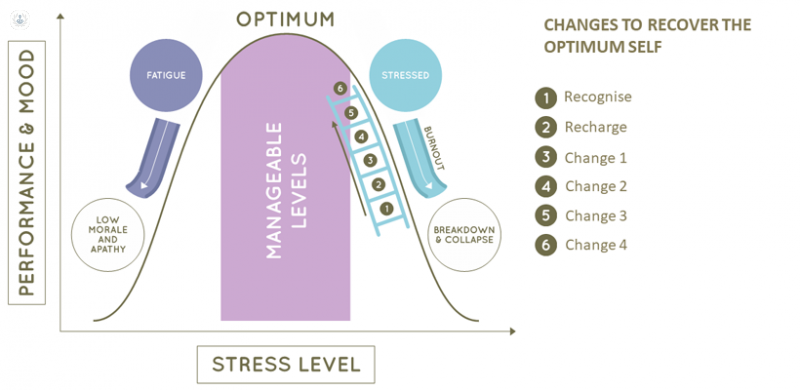On the slippery slope to burnout? Climb your way back to optimum health
Escrito por:Mental health is with us everywhere we go, including our places of employment. Burnout in the work place is becoming an increasingly reported condition, and more and more people are recognising how they’re overwhelmed by meeting both others and their own expectations in their jobs.
Here to offer her expertise on this topic is Dr Catherine Sykes, who is a psychologist and coach in central London.

What is work-related burnout?
Work-related burnout is a state of physical and emotional exhaustion. It often involves a sense of reduced accomplishment and loss of personal identity. Let's look at this graph to explain further.

Along the horizontal line, we have stress levels, or demand levels. Up the vertical line, we have performance and mood levels. We all have an optimum zone; that's when life feels manageable. The amount of stress and demands that we have, we can cope with them. This is when our performance is enhanced and we're feeling good about life. If we step outside of that optimum zone, we start to feel stressed. That's okay; the body and mind can cope with occasional stress. We are actually very well designed to cope with occasional stress.
The problem occurs when we're in this zone for too long and it becomes more of a lifestyle; being permanently stressed, permanently having too much to deal with, like excessive demands and expectations. When you're in that zone of feeling stressed for too long, you're at risk of going down this burnout slope.
I've represented it here as a slippery slope on this graph just to show how quickly you can move from feeling stressed to burnout. Unfortunately, at the bottom of that burnout slope is breakdown and collapse. That's not a good place to be. So being outside of that optimum zone permanently stressed puts you at high risk of burnout.
Other things that put you at high risk of burnout is when the demands and stresses that you're dealing with are high, but also, you've got low rewards for those demands. So that could be financial rewards, but also psychological rewards. So, if you're working really hard, you're not getting praise, you're not getting appreciation, you don't have any meaning or purpose to the demands and stresses that you're dealing with, then that also puts you at risk - a higher risk - of entering the state of burnout.
Also, if you're permanently switched on, and you're getting to that state where you can't really switch off. This is another risk factor for entering that state of burnout.
What are the signs of burnout at work?
Psychologists use a range of different methods to assess work-related burnout. For example, here are some questions that a psychologist might ask a client, and if the client answers yes to the majority of these questions, then it's highly likely they're suffering from burnout.
Those are questions for a quick assessment of work-related burnout. Here are some very common symptoms of burnout:
- Are you stressed on a regular basis?
- Does your work frustrate you to a high degree?
- Do you feel worn out at the end of the day?
- Are you exhausted in the morning at the thought of another day at work?
- Do you find you never have enough energy for family and friends during leisure time?
Further symptoms include:
- Difficulty sleeping
- Feeling like you're at the end of your tether, like you're ready to snap at any moment.
- Feeling snappy and irritated - That snappiness can feel quite permanent and it can make you very irritable. Constant irritability is a sign of burnout.
- Feeling like you aren't really going anywhere - People often describe burnout as though they're not really getting anywhere. They feel like they're on a hamster wheel going around and around, but not really achieving what they want to achieve. Feeling very much out of control.
Are there different stages of burnout?
There are different stages of burnout; as someone steps on to the burnout slide, there's an emotional, behavioural, cognitive and a physiological journey. I've just described the emotional journey of burnout.
First of all, you start feeling quite irritable - this is an early warning sign that you might be suffering from burnout. Then people tend to experience anxiety; some people start to feel unmotivated. The longer you are on that burnout slide, the emotions intensify. People can start to feel lonely, angry - we can move from irritability to anger, and even rage - when you're on that burnout slope.
Eventually as you're getting closer to breakdown and collapse, you feel despair, hopelessness and a sense of detachment. You start to feel very numb and disconnected from the people around you, disconnected from your world. This is a very uncomfortable emotional state to be in.
How long does work-related burnout last for?
It really does depend on each individual. It also depends on how long you've been suffering from burnout. Some people can take a week off and come back to work feeling refreshed and recharged; and that's all it needs. The long you've experienced it, I'm afraid that it lasts for a lot longer. The sooner you recognise burnout and you're already on the journey for recovery. I'm afraid there isn't a set standard time for recovery, it really does depend on each individual.
How is work-related burn out addressed?
There are three key stages for dealing with burnout. First of all, you have to recognise and accept that you are burnt out. You have to name it: 'I am burnt out, this is real.' The next step is some form of recharge and again that really does depend on the individual. For some people, a couple of days of work is enough. For some people it's months off work, depending on the intensity of the burnout.
The next step is to recover, to go back into that optimum zone. However, for some people it's discovering that optimum zone. I work with people who have never worked in that optimum zone, they've constantly lived a life of pushing themselves, expecting too much for themselves, having to deal with lots of lots of stresses.
On one level, it is simple, go back to the place where you operate well. But humans are complex. And it can be difficult. For some reason, the label of 'burnout' makes them think: 'I'm weak.' It makes them feel a deep sense of shame for recognising that they can't cope with all of these demands. So, we have to deal with that first. We have to deal with the deep-seated sense of shame, just recognising: 'My life might not be working for me, I might need to make some changes.'
Have you worked with a patient who has successfully overcome work-related burnout?
I have; in fact, it's part of my daily practice. I work in the City of London so everyday I'm helping people recognise and deal with burnout. Let me just tell you what that looks like. As I said, burnout can be a bit of a slippery slope. Once you recognise burnout, then you have to get back into that optimum zone.
We've got to recognise what changes might be needed to get back up there and I support my patients with that process. Sometimes it can feel a bit like, three steps forward and two back. But we have to recognise there is a climb, a bit of a journey into that optimum zone. Then we have stay in that optimum zone as much as possible to find a way where they can understand and manage their stress levels, stay in that optimum zone and ultimately have better performance and mood.
Lots of people think that by pushing themselves, they're actually increasing their performance, that they can do more. I'm afraid that the opposite is true. We need to stay within our optimum zones to increase our performance and experience good mental health.
Concerned about work-related burnout and require expert help? You can make an appointment with Dr Sykes via her Top Doctors profile. If you’d like to learn more, read her book on burnout which you can buy from Amazon.co.uk.


